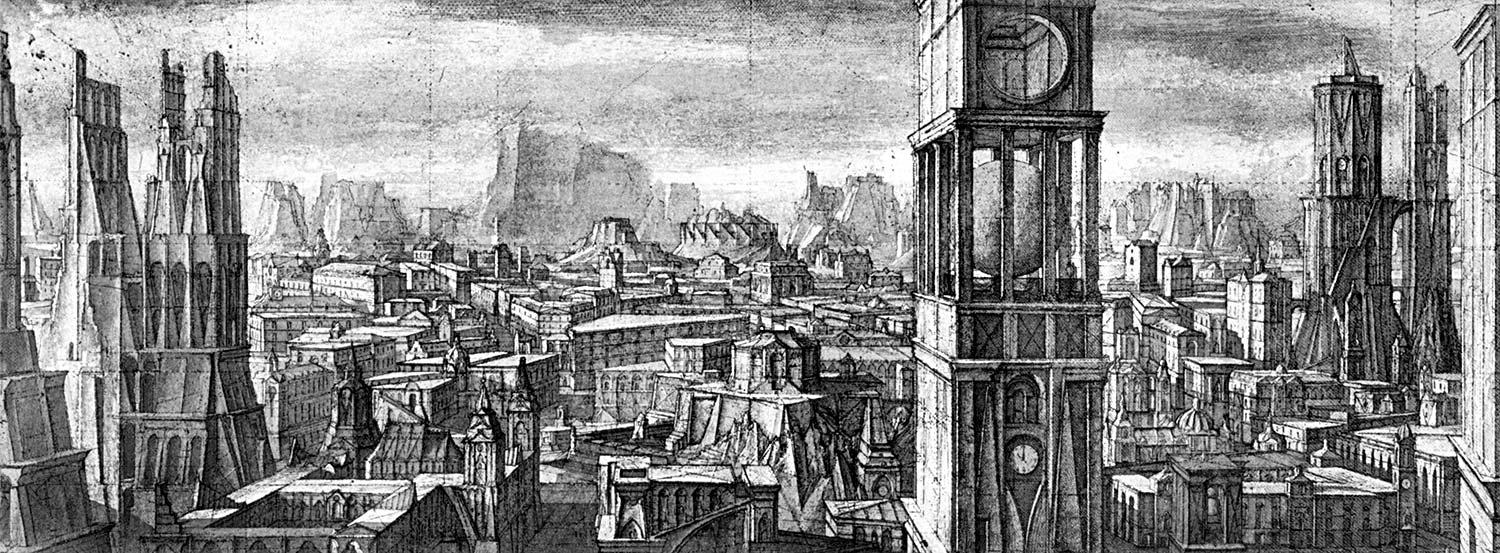August 2017
tender sensibilities
6 August 2017, around 21.29.

‘Ville Imaginaire II’, Erik Desmazieres (1999)
I’ve stumbled into a course of reading where nearly everything resonates with each other, ideas reverberating from page to page and decade to decade, resulting in a common clarity rather than the expected bewilderment. Renee Gladman’s personal essays are enriched by reading them with Pierre Bourdieu’s cultural criticism; Greta Wrolstad’s poems gain meaning from William Carlos Williams’s In the American Grain. Adam Greenfield’s Radical Technologies and Northrop Frye’s The Educated Imagination, on the surface so disparate in tone and content, when read together sound a sort of doomsday note, a warning knell for the best of human endeavors – or perhaps a sort of reveille for their defense. Greenfield’s book looks at how technologies such as the iPhone, automation, and artificial intelligence have disrupted and will continue to disrupt the tenor of human civilization. Frye’s book, as its title suggests, explores the role of education, particularly of literary or imaginative education, in providing dignity to human existence – in particular to humans existing in society, but also those who would persist in the notion that they can exist in isolation as individuals.
They are both gloomy books – Greenfield in particular nerves himself towards the dystopian hysteria so typical of books from Verso. 1 While they do not fall into a C.P. Snow-ish muddle about the potential disharmony of prose and passion, both books are hesitant about the notion of going to the moon or teaching machines to think – for the quite sensible reason that just because a challenge exists, does not mean it is wise to undertake it. Radical Technologies will appeal to those who are already nervous about how much of their personal information their iPhones (or their refrigerators) contain; while Radical Technologies presents several displeasing visions of what the future – as constructed by that faceless terror the ‘global elite’ or the equally faceless spectre of human nature – may hold, it does not offer much guidance for preventing or subverting these changes, nor even a framework for making sense of them. 2
The Educated Imagination is more hopeful than Radical Technologies (not optimistic, mind, but hopeful). The lectures are charming and limpid, building upon each other with the rare and natural grace that is the result of many years of thinking about a subject (a grace lacking, sadly, from Greenfield’s book, though perhaps he could develop it given time). 3 While recognizing the human capacity for bigotry and unwisdom, Frye nonetheless presents an image of the world where human values and human dignity might exist and have meaning, in a way that seems especially poignant in contrast to the terrors of ‘radical technologies’. This passage, from the final essay of The Educated Imagination, captures some of the humane tenderness and fragility both authors are eager to protect:
The civilization we live in at present is a gigantic technological structure, a sky-scraper almost high enough to reach the moon. It looks like a single worldwide effort, but it’s really a deadlock of rivalries; it looks very impressive, except that it has no genuine human dignity. For all its wonderful machinery, we know it’s really a crazy ramshackle building, and at any time may crash around our ears. What the myth tells us is that the Tower of Babel is a work of human imagination, that its main elements are words, and that what will make it collapse is a confusion of tongues. All had originally one language the myth said. That language is not English or Russian or Chinese or any common ancestor, if there was one. It is the language of human nature, the language that makes both Shakespeare and Pushkin authentic poets, that gives a social vision to both Lincoln and Gandhi. It never speaks unless we take the time to listen in leisure, and it speaks only in a voice too quiet for panic to hear. And then all it has to tell us, when we look over the edge of our leaning tower, is that we are not getting any nearer heaven, and that it is time to return to earth.
- Which makes it sound as if I do not admire and respect their work, which of course I do or I would not read their books.[↩]
- Aside from leaning heavily on Deleuze and Foucault, as one often does when drunk on theory.[↩]
- Each chapter in Frye’s book takes its title from a poem or novel, and he explains his choice for each with deceptive artlessness, influencing the reader’s mind without appearing to do so, as the tone of a song can alter the listener’s mood whether they understand the tonic or not.[↩]
mistook
12 August 2017, around 12.00.

portents
21 August 2017, around 9.22.

